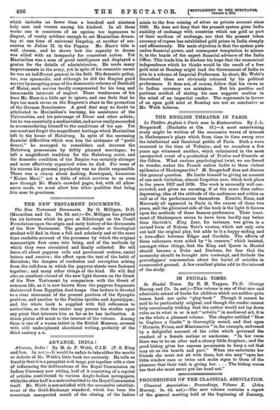THE ENGLISH THEATRE IN PARIS.
Le Thiciere Anglais a Paris sous la Restauration. By J.-L. Borgerhoff. (Hachette et Cie. 5f.)—A most entertaining study might be written of the successive waves of interest in Shakespeare's plays which from time to time sweep over the intellectual and theatrical public of Paris. Such a wave occurred in the time of Voltaire ; and we ourselves a few years ago witnessed another, which culminated in the most unexpected event of a production of Troilus and Cressida at the Odeon. What curious psychological twist, we are forced to wonder, makes the French nation liable to these violent epidemics of Shakespearitis P M. Borgerhoff does not discuss this general question. He limits himself to giving an account of one such visitation, almost forgotten now, which took place in the years 1827 and 1828. The work is unusually well con- structed, and gives an amusing, if at the same time rather depressing, idea of the attitude of the audiences and critics as well as of the performances themselves. Kemble, Kean, and Macready all appeared in Paris in the course of these two years, and the gloomiest side of the book is the light it throws upon the methods of these famous performers. Their treat- ment of Shakespeare seems to have been hardly any better than Garrick's. Sing Lear, for instance, was given in a revised form of Nahum Tate's version, which not only cuts out half the original play, but adds to it a happy ending and a love-affair between Edgar and Cordelia. The efforts of these reformers were aided by " la censure," which insisted, amongst other things, that the King and Queen in Hamlet should become a Duke and Duchess, for fear that the monarchy should be brought into contempt, and forbade the gravediggers' conversation about the burial of suicides in consecrated ground. A few excellent plates add to the interest of the study.


































































 Previous page
Previous page